Best Multi-Currency Crypto Wallet 2024-2025 for Beginners and Advanced
As the cryptocurrency market expands, managing a portfolio of different digital assets has become essential for investors. A multi-currency crypto wallet offers the convenience of storing, managing, and transacting multiple cryptocurrencies all in one place. With the market valued at USD 910.3 million in 2021 and projected to grow significantly by 2028, selecting the best wallet for multiple cryptocurrencies is crucial to keeping your digital assets safe and easily accessible. This article will guide you through the top multi-currency wallets available in 2024-2025 and help you choose the one that best suits your needs.
What is a Multi-Currency Crypto Wallet?
A multi-currency digital wallet is designed to store, manage, and transact with various cryptocurrencies within a single platform. Unlike wallets supporting only one asset, a multi-chain wallet allows users to interact with multiple blockchain networks. For example, the best wallet for Bitcoin and Ethereum can also support many other digital assets, making it easier to manage a diversified portfolio. These wallets evolved from the early days of Bitcoin and now come equipped with advanced features such as staking, dApp support, and even interaction with decentralized finance (DeFi) protocols.
Why Are Multi-Currency Crypto Wallets Better Than Regular Crypto Wallets?
Multi-currency wallets offer several advantages over single-asset wallets. Here are some of the reasons why they are better for users:
- Diverse asset management. A wallet for managing digital assets allows users to hold a variety of cryptocurrencies, from Bitcoin to lesser-known altcoins, making it easier to maintain a diversified portfolio.
- Multi-chain compatibility. A multi-currency wallet supports several blockchain networks, ensuring seamless transactions across different cryptocurrencies.
- Crypto portfolio management. A wallet for crypto portfolio management makes managing a wide range of assets easier, as it offers consolidated views and simplified tracking.
- Investment flexibility. Many multi-currency wallets offer staking features, which turn them into multi-currency wallets and enable users to earn rewards from their holdings.
- Broad access to DeFi. These wallets often support dApp integration and cross-chain wallets, allowing users to interact with decentralized applications and services and expanding the scope of what they can do with their digital assets.
Top 6 Best Multi-Cryptocurrency Wallets in 2024-2025 – Comparison
1. Walletverse
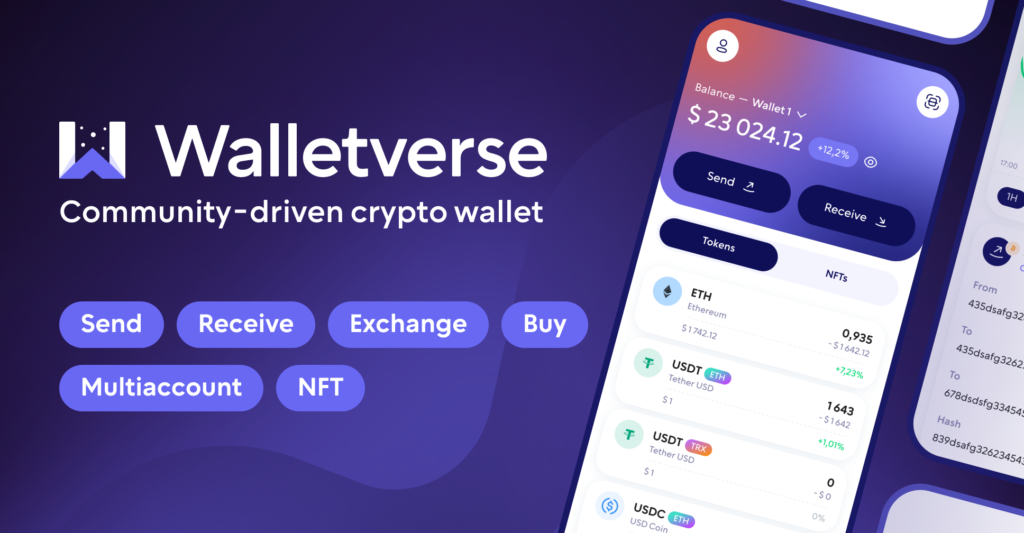
Walletverse is a cutting-edge multi-currency mobile wallet that supports more than 600 cryptocurrencies. This user-friendly multi-currency wallet is perfect for beginners and advanced users, offering features such as multi-account support, secure storage, and fast transactions. It allows you to buy and sell crypto using various methods like Apple Pay, Google Pay, and credit cards and supports popular fiat currencies such as USD, EUR, and AUD.
- Supports over 600 cryptocurrencies, including Bitcoin, Ethereum, HMSTR soon, USDT and more;
- Secure with biometric authentication and passcode protection;
- Seamless wallet for buying and selling crypto with diverse payment options.
Cons:
- Mobile-only app yet.
2. Trust Wallet
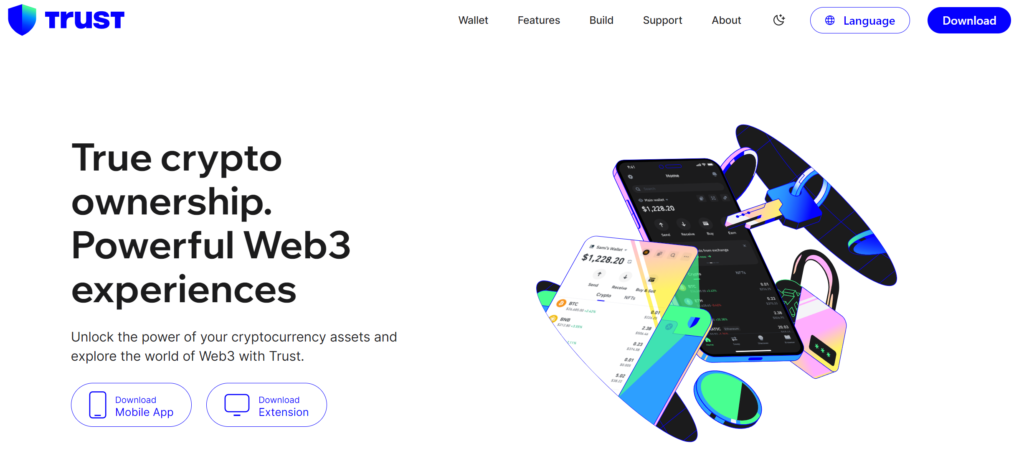
Trust Wallet is Binance’s official wallet, supporting over 140 cryptocurrencies. It excels as a decentralized multi-currency wallet, giving users full control over their private keys while enabling staking and easy access to DeFi protocols. Although primarily a mobile-first solution, it supports a wide array of assets and is excellent for those looking to manage multiple coins on the go.
- Top wallet for diverse crypto assets, including NFTs and altcoins;
- Simple interface with staking capabilities for rewards;
- Secure and decentralized wallet.
Cons:
- Only available as a mobile app.
3. Exodus Wallet
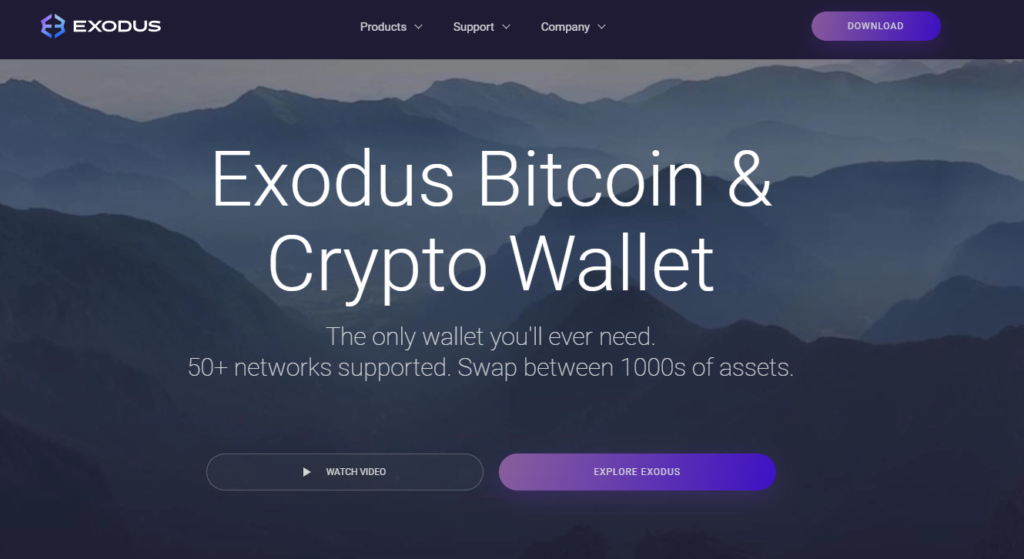
Exodus is a highly versatile, non-custodial multi-currency wallet that supports over 50 blockchain networks. It allows users to store many assets, including Bitcoin, Ethereum, Solana, etc. Its built-in exchange makes it easy to trade assets directly within the wallet, while its integration with Trezor hardware wallets ensures additional security for those needing extra protection.
Pros:
- Broad multi-chain wallet support with user-friendly design;
- Excellent for crypto traders with its built-in exchange;
- Hardware wallet for multiple cryptocurrencies through Trezor integration.
Cons:
- Lacks two-factor authentication (2FA).
4. MetaMask
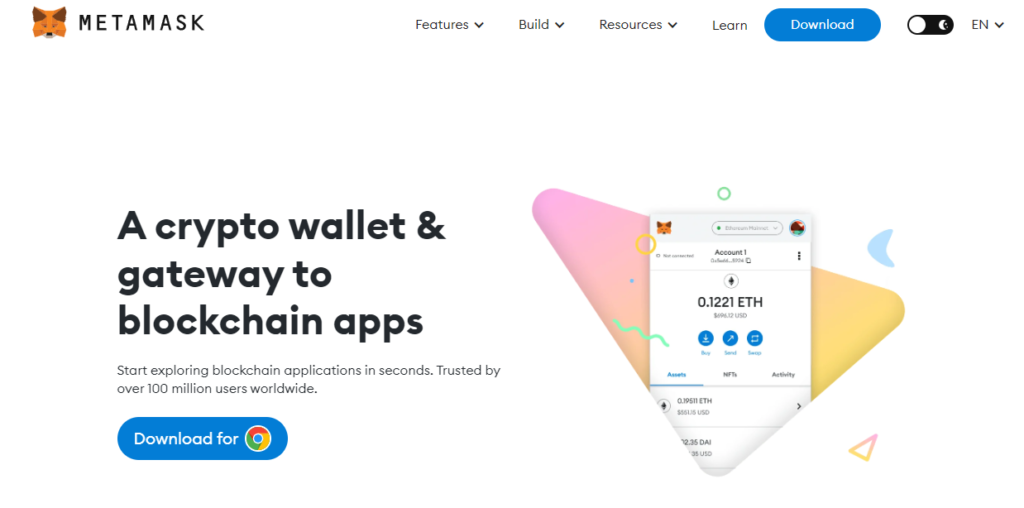
MetaMask is a flexible multi-currency crypto wallet that supports multiple blockchains such as Ethereum and Binance Smart Chain. It provides users with private key control and encryption, ensuring high security. Users can easily swap tokens, interact with dApps, and manage assets, making it one of the most widely used wallets in crypto.
Pros:
- Excellent wallet with dApp support for DeFi applications;
- Supports multiple blockchain networks, including Ethereum and BSC;
- User-friendly with private key encryption.
Cons:
- No recovery option if seed phrases are lost.
5. Coinbase Wallet

Coinbase Wallet offers a secure, multi-asset wallet with security features designed to manage a wide range of digital assets, including NFTs. It supports various blockchain networks, allowing users to trade, stake, and interact with dApps across ecosystems such as Ethereum and Layer-2 solutions. Not requiring personal information for transactions enhances privacy, making it a great wallet for storing tokens from different blockchains.
Pros:
- Best wallet for storing NFTs and tokens;
- Supports staking and dApp access across multiple networks;
- User-friendly multi-currency wallet interface.
Cons:
- Limited advanced features compared to some competitors.
6. Ledger Nano X
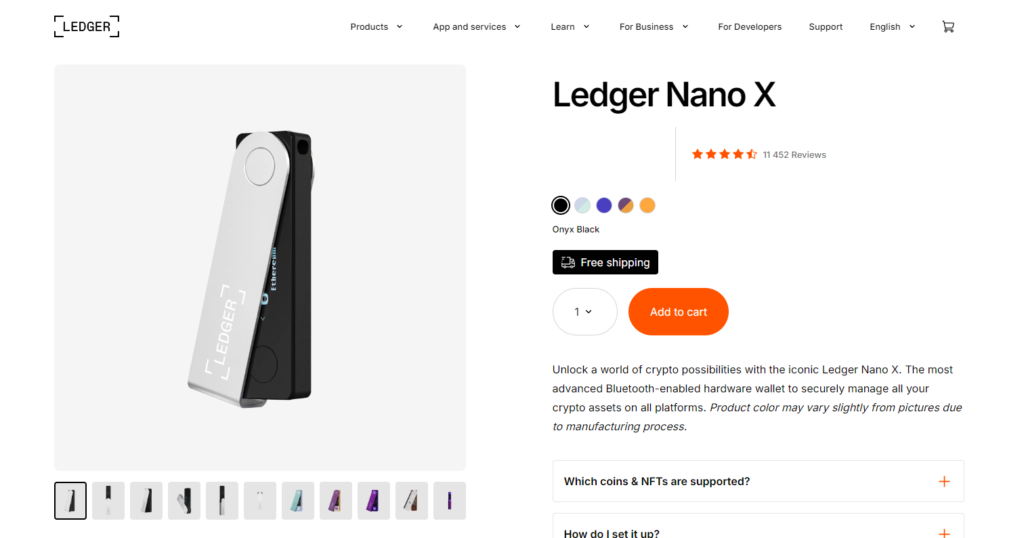
The Ledger Nano X is a top-rated wallet for 2025 crypto storage, offering unparalleled security as a hardware wallet for multiple cryptocurrencies. It stores private keys offline, making it virtually immune to hacks. The wallet supports many cryptocurrencies and integrates with popular wallet software, giving users flexibility and security in managing their digital assets.
Pros:
- Maximum security with hardware wallet functionality;
- Supports a vast array of digital assets;
- Great for long-term crypto storage.
Cons:
- Less convenient than mobile or software wallets.
How to Protect a Multi-Currency Crypto Wallet?
Securing your multi-currency wallet is vital in protecting your digital assets. Here are some steps you can take to safeguard your wallet:
- Use a hardware wallet. Consider a hardware wallet for multiple cryptocurrencies like the Ledger Nano X, which keeps your private keys offline for maximum security.
- Biometric authentication. Enable features such as biometric access to add an extra layer of protection.
- Backup your seed phrase. Always keep your seed phrase secure and never share it with anyone.
- Stay updated: Regularly update your wallet software to ensure you have the latest security patches.
- Use multi-signature options. Some multi-currency wallets offer multi-signature functionality, adding another layer of protection.
Choosing the best multi-currency wallet is essential for anyone managing various digital assets. Whether you’re looking for convenience, security, or access to DeFi applications, a wallet will meet your needs. Walletverse stands out for its versatility and ease of use, while options like Ledger Nano X provide unmatched security for serious investors. Make sure to choose a wallet that aligns with your crypto goals and security preferences.
FAQ
Most frequent questions and answers
The best wallet depends on your needs. Walletverse is ideal for users looking for a user-friendly multi-currency wallet that supports over 600 cryptocurrencies. At the same time, Ledger Nano X is best for those seeking maximum security with a hardware wallet for multiple cryptocurrencies. Both options offer excellent features and flexibility, ensuring safe and convenient management of diverse assets.
A multi-chain wallet supports multiple blockchain networks, allowing users to store and manage cryptocurrencies such as Bitcoin, Ethereum, and altcoins. These wallets enable seamless interaction with various ecosystems, including decentralized finance (DeFi) and non-fungible tokens (NFTs). Users can manage assets across chains using a wallet supporting multiple blockchain networks in one unified platform.
A multi-chain wallet supports multiple blockchain networks, allowing you to store assets from different chains like Bitcoin and Ethereum. On the other hand, a cross-chain wallet facilitates transfers between different blockchain networks, enabling seamless movement of tokens across chains. Both options provide more flexibility than single-chain wallets, but cross-chain wallets focus on interoperability between blockchains.
While no wallet supports every cryptocurrency, many multi-currency wallets, like Trust Wallet and Walletverse, support hundreds of different assets, including major cryptocurrencies and lesser-known tokens. These wallets are perfect for managing a diverse portfolio and ensuring compatibility with the most popular blockchain networks.
Most multi-currency wallets can store hundreds of different coins and tokens. For example, Walletverse supports over 600 cryptocurrencies, including major assets like Bitcoin, Ethereum, Ripple, Shiba Ina, DOGE, HMSTR soon. This makes these wallets perfect for users who need a wallet to store tokens from different blockchains.
The security of a multi-currency wallet depends on its design and how users handle their private keys. Hardware wallets like Ledger Nano X provide the highest level of protection by storing private keys offline. In contrast, software wallets such as Exodus and Walletverse offer features like biometric authentication and encryption to safeguard assets. For the most secure experience, consider using a multi-asset wallet with security features such as multi-signature functionality and private key control.